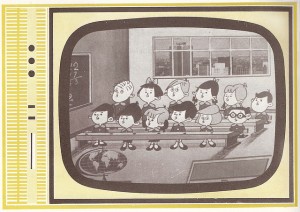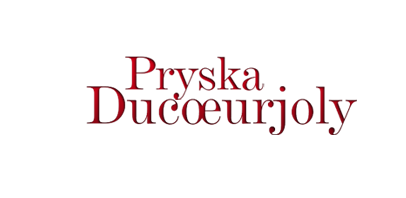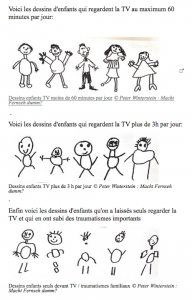
Just because we receive a lot of information does not mean we are well informed…
Sneakier than pollution our plates, water or air, we need to consider mental pollution.
Images and information provided by our company ultramédiatisée can indeed lead to a true intoxication1, the medical sense : an "altered state of health caused by the action of a toxic substance (poison) on the body ".
The idea that the information that we perceive to be a source of disease is not common.

photo Lord Jérôme, sur Flikr, CC
The possibility that thoughts can make us sick is rejected by medicine, This does not prevent some doctors to handle, sometimes wrongly, the argument of "psychosomatic" when they are disarmed before an event…
Why are the French the world's largest consumers of antidepressants ? This general imbalance of the psyche2 is it just difficult living conditions ? Probably not. For television and the media in general have their share of responsibility. Their anxiety information keep us in a permanent state of alert, what is the definition of stress. The media hype and the dependence on the news of 20 hours may be an aggravating factor for people sensitive to psychosomatic disorders !
Chronic stress media
Stress is characterized by a reaction of the body to an adaptation effort (more or less) imposed by social life. Stress activates hormonal and neural processes based on a maximum state of attention, which implies increased heart rate and alertness. Stress is beneficial when short because it can respond positively deal with an emergency : prepare a review, narrowly avoid an accident, etc..
In contrast, un stress permanent (chronic) is pathogenic because it leads to the depletion of the body that can no longer activate the "relax" mode. We continually exposing information that "zooms" ever on insecurity, violence, suffering, insecurity, we maintained despite us in this state of chronic stress.
This is shown : Chronic stress depletes our immune system (which is the first pillar of our health). Two American psychologists3 compiled nearly three hundred studies - which have been published over thirty years - on the relationship between stress and immunity. Total, nearly nineteen thousand individuals participated in these studies, of all ages, but mostly young (middle aged : 35 years), usually healthy.
Their results confirm the association between stressful events and changes in our immunity. These changes depend on the nature and duration of stress, but also of the individual's resilience. In this study, the most chronic stress associated with immunosuppression4 the broader. Thus, the extension of stress "is potentially adaptive changes move to potentially harmful changes".
In other words, chronic stress will lead to a loss of self-regulation of the immune system makes us "more vulnerable to the adverse immunological effects of stress". A real vicious circle5.
Where are the good news?
Not only media company maintains us in a continuous stress but it is even more difficult to bear than hammered information is rarely compensated by the good news that could "reassure" the immune system.
"What is the length of TV broadcasts ? It suggests that the world is dangerous, the invaders lurking, that poverty devastates the South, that crazed gunmen strafed children in schools ", commenting on their side and Michael René Blind Pool, in their book The machine décérébrer6. "The answers to evil proposed on the screen are ridiculous : only a Superman which a child 5 years continues to believe can save the world. Faced with poverty in the slums de Calcutta, there is that Mother Teresa. Heroes or saints. Ever our strength, common sense, solidarity, our freedom solve problems. This feeling of powerlessness causes impotence. These images of suffering are suffering, these messages anguish feed our anxieties, et tout cela ne saurait nous conduire à la santé… »
Que penser par ailleurs du nombre de séries télévisées violentes et sanglantes sur lesquelles tombent régulièrement les enfants, les plongeant dans un stress visuel dont ils peinent à s’extraire sans l’aide de leurs parents ?
Obesity : impossible to exercise critical thinking
Other problem, information overload. Hammered a large number of times and in all directions, information enters our brain without us being able to take the necessary step back to analyze it or exercise our critical thinking. The brain accepts them for “true” since they follow one another quickly.
Infobesity can also lead to a phenomenon called “cognitive overload” recalls this interesting file produced at the University of Strasbourg. (LIEN).
This cognitive overload is linked to working memory, if too much information (relevant or not) are located in working memory, when the cognitive load mobilized exceeds the available resources there is then cognitive overload. The cognitive resources required for a task depend on the subject's level of expertise in the relevant level, of its level of development and the strategy it adopts.
Also the overload can be the result of:
• different sources of information simultaneously, the user does not have a sufficiently effective strategy to integrate them
• too many options, users unable to prioritize
• disorientation, the user faced with complex navigation will have to overload his short-term memory with information helping him to find his way, thus limiting the attention he can pay to the content.
This overload manifests itself at different levels:
• intellectual: mental disorganization, inability to classify problems and resolve them
• emotional: stress, feeling of distress, aggressiveness, emotional fragility
• physique: Back ache, muscle tension, agitated sleep
Intoxication aiguë et chronique
While, l’exposition à la télévision ne nous rend pas immédiatement malades. Il ne s’agit donc pas d’une intoxication aiguë, à la manière d’une indigestion qui nous clouerait au lit dans les trois heures qui suivent le repas. However, quelques rares fièvres médiatiques ne sont pas si éloignées de ce concept d’intoxication aiguë, to the extent that they are able to generate a sudden and intense emotional trauma and manufacture a collective consent by making us give up (or lose) the reason. Such a delirious patient under the effect of fever, our collective behaviors can find altered.
This was the case of Sept. 11, where the shock images allowed to readily accept a large portion of the world population the war against terrorism, without us we can ask any questions about the appropriateness of such an undertaking. « Les images des avions qui s’écrasaient et de l’effondrement des tours ont créé un effet de choc en même temps qu’elles suscitaient de violentes émotions », écrit Carol Gluck, de l’université de Columbia, in 11-Septembre. Guerre et télévision au XXIand siècle7.
“The pathological public sphere “
« Mais le phénomène le plus remarquable, en ce qui concerne l’économie politique de la télévision dans les jours qui ont suivi le 11-Septembre, a été la combinaison d’une diffusion compulsive par les directeurs de programme et d’une consommation obsessionnelle d’images par les téléspectateurs. Certains ont confessé être restés comme ” scotchés ” devant leur poste, regardant en boucle les mêmes images d’horreur, sans être vraiment conscients de ce qu’ils faisaient. Outre la fascination pour l’inimaginable image — et celle-ci l’était bien —, voire le lien (malsain) entre terrorisme et sublime, peut-être l’attirance pour l’épouvantable grandeur de l’événement est-elle un exemple de ce que Mark Seltzer a appelé ” la sphère publique pathologique “, dans laquelle le spectacle des catastrophes et de la mort non seulement nous attire mais nous rapproche aussi les uns des autres, dans un acte social d’identification aux victimes », rappelle Carol Gluck.
Hormis cet exemple qui a généré un stress intense et immédiat, et une réponse immunitaire collective face à l’agresseur terroriste, le matraquage télévisuel relève plus communément de l’intoxication chronique. À la différence de l’aigu, la chronicité se caractérise par une évolution lente, sans signe apparent. Notre système immunitaire est obligé de composer chaque jour avec des informations malsaines, distillées de manière continue, des « toxines à bas bruit » (c’est-à-dire des pensées poisons que nous ingérons à faible dose mais de manière ininterrompue et sur de longues années). Ce type d’intoxication est difficile à repérer, mais ses effets sur le long terme n’en sont pas moins dévastateurs. La chronique médiatique nous épuise sans que nous puissions clairement en identifier la cause.
This makes it easier to control us
We are continually exposed to information, gradually, make their way into our minds, finally bringing us to a form of alienation, that is to say, to make our own thoughts that do not come from our personal reflection, but those media. These convey a vision of society that darker light. Because of so many media hammering, we finally accept this distorted view of reality. Made fearful and distrustful, we become more concerned about our own safety as the evolution of our humanity. This makes it easier to control us.
All information these pathogens are killing us slowly than they guide us to full health ! When we listen to the radio or watch television, the risk / benefit ratio does not in our favor. Especially that advertising adds a layer and pushes us to risk behaviors : eat ever, preference for fat and sugar, run at full speed in powerful sedans, use of technological gadgets rather than our actual capabilities.
If the media really wanted to represent a toxic threat to the population, they would not have much to change in their functioning. It is urgent to question and ask them what they did for their alleged vocation to serve humanity ! And what they do in our license fee…
NOTES :
1Term attested in 1484 as intosiquer, "Poisoned by poison" and 1521 as intocciquer, "Morally poison". In 1823, the word means "poisoned by the absorption of a toxic" (Boiste). The reflexive form s’intoxiquer was found in 1883. Borrowed from medieval Latin intoxication, derivative toxicum (toxic). Unknown to XVIIand and XVIIIand centuries, the word was reintroduced in 1823 ; it is now experiencing true prosperity !
2This term refers to analytical psychology all the conscious and unconscious manifestations of personality and of the human intellect. The word psyche (derived from Ancient Greek) means "soul", "Spirit".
3The findings of Suzanne Segerstrom (University of Kentucky) and Gregory Miler (University of British Columbia) were published in the Psychological Bulletin de l’American Psychological Association le 5 July 2004.
4 The immunosuppression is partial or complete suppression of immune responses.
5Read about it The Standing Stress, psychiatrists Pierre and Henri Lôo and André Galinowski, Masson editions (3and edition, January 2003).
6 David Grossman, René Blind et Michael Pool,How television and video games teach children to kill, monitoring The machine décérébrer, Youth editions, 2003.
7Éditions de l'EHESS, Annals. History, Social Sciences, January 2003, pages 135 to 162.
Related Articles
Keywords: news, toxic society, average, Chronic stress, TV


I totally agree with the comment below, it is clear that mediate manipulate the minds of French and surveys with deflected issues .
If the media really wanted to represent a toxic threat to the population, they would not have much to change in their functioning. It is urgent to question and ask them what they did for their alleged vocation to serve humanity ! And what they make our TV license ...